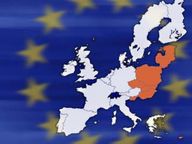|

A mere two years ago, the British author and thinker Mark Leonard published a book titled "Why Europe Will Run the 21st Century." Today, one wonders to what degree Europe will even participate in the 21st century. It's not just the deadly blow struck by Ireland's rejection Thursday of the Lisbon Treaty reorganizing the European Union. I've spent six of the past eight years in the capital of the European Union, and I've noticed over this period a steady loss of self-confidence in Europe, a turning inward and a growing pessimism about the future.
For all the focus on the ills of the American economy, few Europeans feel they are about to inherit the world. Germany's economy is riding high these days, but it is exceptional, and even Germans fear it may be temporary. The pleasure Europeans take in the weak dollar and the high euro is a welcome distraction from deeply rooted fears that the Asian giants are overtaking and out-competing Europe in the international economy. Europe's big neighbor also causes angst. Every day some European official pleads for a common energy policy to confront predatory Russian monopolists, but every day the Russians cut a new deal favoring one European interest at the expense of another.
Europeans worry about immigration and cultural identity much more than they did when I arrived here. Most elections in Europe these days have immigration and assimilation issues as a subtext, and most people I talk to doubt Europe will be able to integrate the new immigrants. Even secularists worry that what they call "Christian" Europe is being undermined by the endless flow of Muslims and Muslim culture -- hence the outcry early this year at the archbishop of Canterbury's modest suggestion that sharia law be accommodated in Britain.
More surprising, perhaps, is the continuing challenge to European unity. The European Union remains a miraculous organization, and no one should ever bet against its continued progress. But the big European powers jealously guard their prerogatives in matters of foreign policy, especially and understandably when it comes to putting troops in harm's way.
To compound matters, the consensus here is that Europe is bereft of strong leadership. Gordon Brown is seen as weak. Angela Merkel is locked in her grand coalition. Many Americans and Italians like Silvio Berlusconi, but most Europeans outside of Italy do not. When as a typical American I point to the refreshing new leadership of Nicolas Sarkozy, outside of France I get mostly silence or scowls. In Britain and Germany, Sarkozy is viewed as all flash and in it for France, not for Europe. Self-interest is seen everywhere to be trumping the common interest.
The Lisbon Treaty was supposed to solve some of these problems. It would have created two potential leaders to represent Europe on the world stage: a president and a foreign minister. Names being bandied about for the two jobs, from Tony Blair to Sweden's Carl Bildt, made it possible to imagine Europe taking a stronger role in the world, even amid all the doubts. To Euro-enthusiasts across the continent, the new constitution was the answer to Europe's malaise and the next step toward global leadership. But what now, since the treaty is dead?
All of this is bad news for the United States. In a world of rising great powers, of which two happen to be autocracies, the United States needs its fellow democracies to be as strong as possible. A unified, independent, capable Europe is in American interests, even if we may disagree at times. I would much rather see Europe run the 21st century than Vladimir Putin's Russia or Hu Jintao's China.
The danger of this latest blow to European confidence is that our allies, including Britain, could gradually sink into global irrelevance. Already there are voices in London welcoming it. The Financial Times's Gideon Rachman believes that the majority of Europeans, if not their leaders, prefer irrelevance and are right to do so. It's better than having to be like the United States, with responsibilities all over the globe. After all, "being a superpower can be a burdensome and bloody business," he writes. Europe's weakness is a kind of "nirvana."
Rachman is certainly right that many Europeans prefer it this way. Europe has started to settle into a role akin to the chorus of a Greek tragedy, endlessly commenting and pronouncing judgment on the actions of the protagonists -- "O Oedipus, by reckless pride undone!" -- but with little or no effect on the outcome of the drama. And perhaps Europe -- the Europe lacking in leadership, the Europe now lacking a new treaty -- is the way it is because that's what the people really do want. If so, the 21st century, decidedly not run by Europe, will be a very tricky time for the United States.
|



